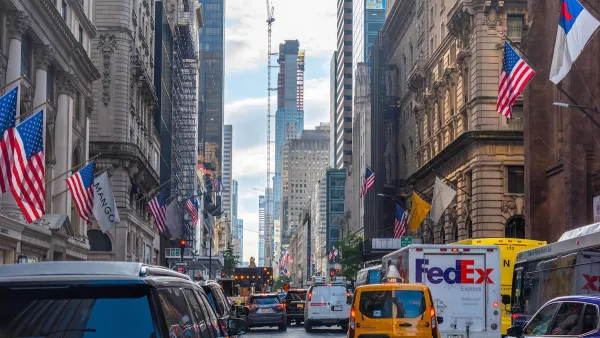Members of the New York State Assembly decided late Monday not to vote on New York City Mayor Michael Bloomberg's congestion pricing plan, a plan that the state would have needed to approve by April 7 to be eligible for more than $350 million.
"Democratic members of the State Assembly, who control the chamber, held one final meeting to debate the merits of Mr. Bloomberg's plan, ultimately conferring - in secret - before Sheldon Silver, the speaker, emerged to announce the outcome. The opposition was so overwhelming, he said, that he would not hold an open vote of the full Assembly, though many Republicans were supportive of Mr. Bloomberg."
"'The congestion pricing bill did not have anywhere near a majority of the Democratic conference, and will not be on the floor of the Assembly,' Mr. Silver, who represents the Lower East Side of Manhattan, said after his meeting with fellow Democrats. A spokesman for Mayor Bloomberg quickly denounced the decision as 'one of the biggest cop-outs in New York's history.'"
"At about 6 p.m., legislative leaders emerged from the meeting saying that the congestion pricing plan was dead with no hope of resuscitation. Senate majority leader Joseph L. Bruno said the Assembly had adjourned until Tuesday morning without ever taking a vote on the bill."
"Mr. Silver said if the Assembly would have held an official vote, fewer than 25 members of the chamber would have voted in favor of the bill. Mr. Bruno emerged from the meeting appearing a bit less flustered and frustrated than when he went in, saying that the budget was closer to being finished, that finalizing the spending plan has been tough going."
FULL STORY: Congestion Pricing Plan Is Dead, Albany Leaders Say

Maui's Vacation Rental Debate Turns Ugly
Verbal attacks, misinformation campaigns and fistfights plague a high-stakes debate to convert thousands of vacation rentals into long-term housing.

Planetizen Federal Action Tracker
A weekly monitor of how Trump’s orders and actions are impacting planners and planning in America.

In Urban Planning, AI Prompting Could be the New Design Thinking
Creativity has long been key to great urban design. What if we see AI as our new creative partner?

King County Supportive Housing Program Offers Hope for Unhoused Residents
The county is taking a ‘Housing First’ approach that prioritizes getting people into housing, then offering wraparound supportive services.

Researchers Use AI to Get Clearer Picture of US Housing
Analysts are using artificial intelligence to supercharge their research by allowing them to comb through data faster. Though these AI tools can be error prone, they save time and housing researchers are optimistic about the future.

Making Shared Micromobility More Inclusive
Cities and shared mobility system operators can do more to include people with disabilities in planning and operations, per a new report.
Urban Design for Planners 1: Software Tools
This six-course series explores essential urban design concepts using open source software and equips planners with the tools they need to participate fully in the urban design process.
Planning for Universal Design
Learn the tools for implementing Universal Design in planning regulations.
planning NEXT
Appalachian Highlands Housing Partners
Mpact (founded as Rail~Volution)
City of Camden Redevelopment Agency
City of Astoria
City of Portland
City of Laramie





























